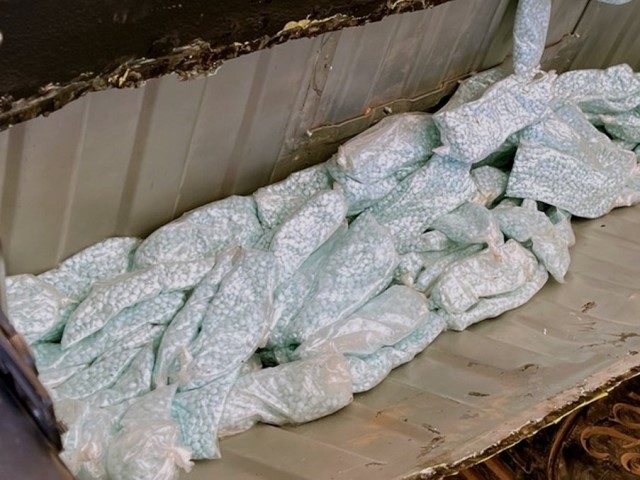Mexican cartels are taking advantage of the migrant crisis along the southwestern border to move fentanyl and methamphetamine-laced pills to all parts of the United States. Seizures of fentanyl have nearly doubled in 2021.
According to the Drug Enforcement Administration (DEA), Mexican cartels perfected the mass production of fentanyl and fentanyl-laced pills using precursor chemicals typically sourced from China. The cartels move fentanyl and counterfeit opioid pills through a network of associates from the border to cities across the U.S.
The manufacture and trafficking of fentanyl and related products are highly profitable. The pills appear nearly identical to Oxycontin, Percocet, Vicodin, Adderall, Xanax, and other controlled medicines. The pills, according to DEA, are more lethal than ever. In one laboratory test in September, 4 in 10 knockoffs contained a potentially lethal doses of fentanyl.
As the Border Patrol focuses on caring and feeding thousands of migrants daily, the cartels are taking advantage of enforcement gaps. A redirection of CBP personnel from ports of entry to assist the Border Patrol has likely benefited the cartels as well. With reduced inspection capabilities at ports, cartels face reduced chances of losing shipments.
As reported by Breitbart Texas, Border Patrol highway inspection checkpoints were closed as a result of the Haitian migrant crisis in September. Illicit narcotics are routinely encountered at the checkpoints. In one recent seizure on October 13, Border Patrol agents seized 50 pounds of fentanyl-laced pills on Interstate 19 near Amado, Arizona. The fentanyl was pressed into blue pills and concealed within a passenger vehicle.
According to Customs and Border Protection, fentanyl seizures during Fiscal Year 2021 were roughly 100% higher than 2020. In addition to the seizures made by CBP, local and state law enforcement authorities are also encountering the highly organized and sophisticated distribution networks. The proliferation of the fentanyl-laced pills is negatively impacting their communities.
On Thursday, the DEA announced the arrest of 27 defendants from the Rio Grande Valley in connection with the importation and trafficking of fentanyl and methamphetamine pills. The investigation centered on the importation and distribution of the pills from January 2021 to October 2021. The investigation revealed one employee from the IDEA School District in Weslaco, Texas, allegedly facilitated the sales and movement of pills for a cartel.
The impacts of the cartels’ trafficking schemes are felt far outside the immediate border area. In a recent news story, a “historic” amount of fentanyl pills were seized by law enforcement authorities in the greater Atlanta area in October. In one day, law enforcement authorities seized more than 9,000 counterfeit pills and more than 2 kilograms of pure fentanyl.
According to the DEA, more than 9.5 million counterfeit pills have been seized nationwide as of September 2021, which is more than all of 2019 and 2020 combined.
In addition to benefiting from lax enforcement at the southern border, the cartels are leveraging their control over seaports in Mexico to import precursor products. The Cartel Jalisco Nueva Generacion (CJNG) controls Mexico’s busiest port in Manzanillo, importing the necessary chemicals used to synthesize fentanyl from China and India. According to the DEA, the CJNG is responsible for a significant portion of the fentanyl trafficked into the United States.
The United States Department of Treasury recently designated four CJNG members under the Foreign Narcotics Kingpin Designation Act for using the Manzanillo port to move precursors. The effort is designed to weaken the cartel’s stronghold in the area.
DEA issued a Public Safety Alert on September 27, warning the public about the increasing availability of counterfeit opioids.
According to the CDC, more than 96,000 drug overdose deaths were recorded in a 12-month period ending in March 2021. The number of reported drug overdoses rose during this period in all but three states across the country, compared to the previous year.
Randy Clark is a 32-year veteran of the United States Border Patrol. Prior to his retirement, he served as the Division Chief for Law Enforcement Operations, directing operations for nine Border Patrol Stations within the Del Rio, Texas, Sector. Follow him on Twitter @RandyClarkBBTX.

COMMENTS
Please let us know if you're having issues with commenting.